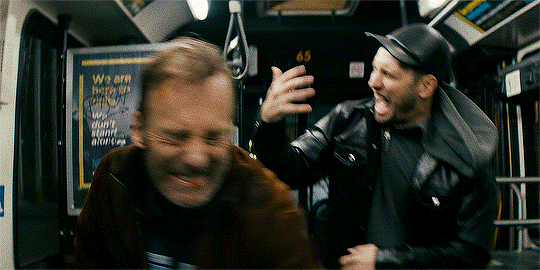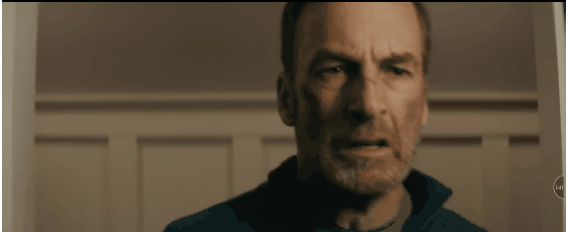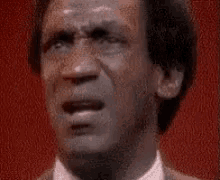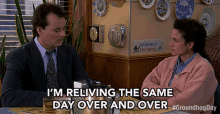Another pressing week nearly behind me, expecting to be mostly on the edge of a winter storm today into Saturday. Southeast and East of us are expecting much heavier amounts, with the latest calls for coastal areas and up into New England to be facing a "bomb cyclone" of a snowstorm. Here we roll into the final weekend of January, the first twelfth of 2022 soon to be behind us.
While it appeared a couple weeks ago, it wasn't until this past weekend that I got around to watching the series-capping Ray Donovan: The Movie (Showtime, 1h 40m). I did a preview set-up for it about mid-way through my post for the 14th.
That the final episode of the series aired almost exactly two years earlier, and I skipped my own recommendation of at least rewatching that one to help get me back into the groove of the chaos the Donovan clan was dealing with as of that season-ender, left me initially a little disoriented as the movie began. That it starts very near the end of the complete story, then variously unfolds both the story that's happened in the present, and one decades in the past when a teenage Ray got his start as a fixer, and made a critical decision concerning his father, Mickey, didn't help my sense of being at sea much. It was past the mid-point of the movie when I finally felt the ground beneath my feet again, with all of the key points refreshed in memory.
Overall I'll rate it a success, and a story-wrapping finis to arguably the two most key characters in the series. In terms of a human, much less a moral, message, specifically concerning Ray's and Mickey's characters, their actions, and justifications... I'd be interested in talking that through with any other fans of the show once they've watched this series-capper.
I will say I'm mildly amazed when I read that someone was surprised by the dramatic final plot turn, though, as it seemed telegraphed a good 40 minutes before the end. I assure you, I'm not one of those who seem to be in competition with the filmmaker, making a point of pride out of not being fooled or surprised. I generally sit back and enjoy the ride, trying to take it as it comes. This just seemed to have such an obvious dramatic path that it seeing it coming was nearly as simple as predicting the route of a train after watching much of the track laid down. Still, part of that was that it was believably true to the characters, particularly one who'd been so recently traumatized.
I don't know that Ray Donovan is a series I'm likely to soon go back and rewatch, but I could easily see me doing that at some point. That decision's made easier by knowing that, in the end, we do get a fairly complete life story arc for Ray. A second run through would help place it all more firmly, and hopefully do so without revealing any false leads and mistakes along the way.
Five episodes in to Peacemaker (HBO Max) and I not only haven't skipped the opening credits dance number, I've rolled back and replayed it once or twice a few times. There are many nice touches in this, all the way down to the little, uncertain, two-step adjustment by Eagly at the very end.
As for the show itself, it's inane, violent, occasionally obscene fun, they're clearly enjoying themselves, and that's the type of infectious I welcome.
The titular character was created in 1966, for one of the also-ran comics companies that has come and gone, Charlton Comics. DC (home of Superman, Batman, etc.) bought their IP inventory out years later, though they've only made sparing use of Peacemaker himself. Probably the biggest splash the character made pre-2021 was very indirectly, as Alan Moore used him (along with various of the then newly-acquired properties that DC now owned but didn't know what to do with) as a conceptual template for one of the Watchmen. In a big stretch, that became The Comedian.
As originally conceived, Peacemaker is a walking, thematic contradiction: a pacifist who loves peace so much he's committed to using force to bring it about. In this DC screen version (set up in 2021's Suicide Squad, where the character was introduced) they just went straight in with a character whose truly awful father raised him as a weapon. Unfortunately, that results in someone who's more parody than human being, a social misfit, which really seems to work for series titular lead, pro wrestler turned actor John Cena, with his hypertrophied, Stretch Armstrong physique.
In the series we get to explore the details of that along the way, and as we see what a cold, hard, racist, radical-Right bastard his old man (played with a wonderful, hard edge by Robert Patrick) is, we gain some sympathy for Chris Smith, aka Peacemaker. We realize that in contrast to his father, Chris is a much better human being than we should have reason to expect. He's just still chasing the approval of a thoroughly awful father. Much of the hook, for me, is seeing the glimpses of the undeveloped human being, and seeing if and how it connects with and is encouraged by the same in the small band of misfits assembled for this mission. What largely remains to be seen is how far they'll really take the story, as a more satisfying journey of growth would mean diminishing the joke. We know they're going to reel some of this back in, because the popularity of the character is based largely on his behavior, and that includes a great deal of extreme actions, casually taken.
I haven't reached out to any of my old associates in DC fandom for a reaction to how it's being handled. I'd expect what's being done with secondary character Adrian Chase/Vigilante to be more of an issue for them, as Peacemaker was never really a big DC thing, while that version of Vigilante was loosely akin to DC's version of The Punisher. Nearly all of the '80s comics version's aspects have been radically changed for this screen version, really leaving little more than the names (Adrian Chase/Vigilante), costume, and a mission to confront crime with an excess of firepower. In this tale, we see that Chase is also a character born of bullying abuse, trying to fit a toxically macho ideal, also with the remnants of the abused human being within seeking to fit in and find human connections. Agendas set by supposed adults behind the larger game end up being the real poison pill, so in that respect there's a bitter floor of reality beneath the comic book trappings.
There are three more episodes to go.
Speaking of inane levels of violence, and oddly enough continuing an unplanned father and sons theme that's strong in each of the previous two items, this past Saturday HBO debuted Nobody (2021, R, 92m)
Bob Odenkirk (perhaps best known these days as Saul Goodman, from Breaking Bad and Better Call Saul) stars as a seemingly unremarkable, ordinary, cautious family man, Hutch Mansell, who has allowed himself to be marginalized. His life seems to be a numbing routine of home, exercise and work, with him surrounded by more overtly dominant people. His marriage is strained, and few seem to judge him as anyone of much consequence. A home burglary turned robbery finds him taking a nonviolent path, allowing the masked couple to leave with their petty haul, creating more friction both at home, with his deeply disappointed son, and to the disapproval and barely-concealed mockery of seemingly everyone else, from neighbors to police to co-workers. Even those who tell him he did the right thing for the sake of his family's safety can't help but follow it up with what they would have done had it been their home and family.
As you may expect, it makes for roughly the first half hour to be a somewhat wearing wind-up, before a final straw is applied to his resolve's back. After that, we begin to see his mask slip. Written by Derek Kolstad, the creator of the John Wick franchise, once the violence starts it only expands and intensifies. We not only get to see what the man is capable of, but gradually get his backstory.
The violence, in large part the punishment the main character not only doles out but takes, soon becomes absurd, so it's not long before we realize there's virtually no ceiling on this violent fantasy outing. Sure, there's blood and fleshy trauma, but none of it is going to do more than lightly, momentarily inconvenience our self-avowed "nobody." The sooner you settle in to the idea that no act of common sense will be allowed to stop this runaway train, the better you'll enjoy it.
 The
cast includes Connie Nielsen as Hutch's wife, Christopher Lloyd as his
father, living in modest retirement in an assisted living community,
Aleksei Serebryakov as the big, bad Russian boss (the piece's main
heavy), and rapper/actor/filmmaker NZA in another key role.
The
cast includes Connie Nielsen as Hutch's wife, Christopher Lloyd as his
father, living in modest retirement in an assisted living community,
Aleksei Serebryakov as the big, bad Russian boss (the piece's main
heavy), and rapper/actor/filmmaker NZA in another key role.Oh! There is a mid-credits and a post-credits scene.
No signs so far (at least not in Odenkirk's imdb credit listings) of a greenlit sequel, though Kolstad is reportedly working on a script. As Odenkirk will turn 60 this year, well... it would be an interesting age to be breaking out as an action star.
This Sunday, Showtime airs the first of a four-part exploration and discussion of Bill Cosby, who he was to so many people, who he turned out to be, and where that leaves the many, many people for whom he had once been a comedy, cultural and social movement icon - especially to the African American community, though it was clear he (the public persona) was almost universally embraced. It's writer/director W. Kamau Bell's We Need To Talk About Cosby.
Circa
1987, I was in the last job I had before disappearing into the world of
geotechnical labs. I was working for a chain video rental store, the
deceptively-named West Coast Video (being founded very much on the East
Coast), and Cosby's 1983 stand-up (well, it was mostly him sitting in a
chair, center of an otherwise empty stage - only getting up occasionally
for comic emphasis) special Bill Cosby: Himself, was something
that would often get put into the store's VCR. There it would play on
the multiple, ceiling-mounted tv's. The store had multiple copies of it,
still, by '87, so along with it being something
with broad entertainment value, yet familiar enough that playing it
casually wouldn't constitute spoiling anything, there was also some
degree of a game in doing so. Inevitably, some of the browsers would be
steered by it over to the Comedy section, and add that to their rentals,
and it would be a countdown to see when someone, unable to find a copy,
would come up to ask and end up renting the copy we were playing. After
all, that's what we were there to do.
Certainly, I understand how many people have found they can no longer look and listen to the man, but I can't just forget how nearly everyone found his routines (much of what was done in that special ended up being mined for sitcom material in his wildly successful family sitcom) funny, and the man himself charming. He was idealized as an exemplar for African Americans, including his decades-long advocacy for higher education, with plenty of specific nods to his own alma mater, Temple U. I'll drop a copy of that special here, from YouTube, as a viewing option. This one appears to be the full special, and has the original audio. Just don't put the captions on unless you read Polish. I'm going to be interested to see how the documentary series plays out, as at least a couple generations of African Americans had this wholesome, yet hip figure welcomed into their homes via tv, and offered as an example for life. Reconciling that, and deciding whether the man's profound moral failings behind the scenes should be allowed to nullify the entertainment and the good he did in that role, remains the big question. None of this is meant to excuse his actions, but is part of the larger question of whether or not people can (and some may even ask if they should) deconstruct public figures, to separate the good from the bad, and keep what is worthwhile. Much as with various literary figures who held loathesome views on race and religion, it strikes me as a ridiculous waste to allow that facet to automatically nullify the other work they did. We will rarely, if ever, find head to toe paragons. Certainly, though, it's not as if I'm characterizing Cosby's behavior as minor moral shortcomings. Ultimately it's going to be an individual choice as to whether engage his legacy in a compartmentalized way, connecting with and embracing the good, or treat the rot as reason to throw it all away.
Changing subjects, this past week HBO premiered the latest from Downton Abbey creator Julian Fellowes, as he turns his attention to issues of power and class-stratified society in the United States of the late 19th and early 20th century, as a sudden, new wave of brazenly conspicuous, wealth-driven power stepped in and very publicly redefined being rich. It's the 9-part dramatic series The Gilded Age.
Based on some early reviews, and knowing what does and doesn't work well for me, I've decided to let at least a few episodes build up before giving it a go. The early setting and character introductions are likely to work better for me if I have the option to allow the story momentum to propel me, rather than deal with introductions and set-up in isolation, then waiting another week so I can ask myself "so who are these people again?"
I'll catch up some other new and returning items next week. If you're in the path of the more extreme elements of this weekend's expected weather, may you be adequately stocked, your electricity and cable/Internet keep flowing, and you have the freedom to be able to stay put, to ride it out in relatively comfort and safety. With Groundhog Day coming up next Wednesday I'd casually suggest watching Harold Ramis' 1993 Bill Murray/Andi MacDowell classic - all the more so if this weekend sees you snowed in - but I see that it's almost completely walled off by Starz, unless one wants to rent or buy it via Amazon, or buy a hard copy.
It's an intersting subject, not only as the successful comedy it is, but both in its increasingly dark concept (which was almost entirely scrubbed out in the development of it as a comedy) and development by Danny Rubin, and how a clash over emphasizing the philosophical elements (Murray's stance) and the comedic ones (Ramis) in the script during filming effectively ended the men's friendship, and certainly their working partnership. The rift was strong and bitter enough that they were out of contact until shortly before Ramis' death. I know too many of us have had similar rifts with old friends and family members, especially in recent years, over social and political matters.
That last-minute, seasonal detour out of the way -- see you in February! - Mike









No comments:
Post a Comment